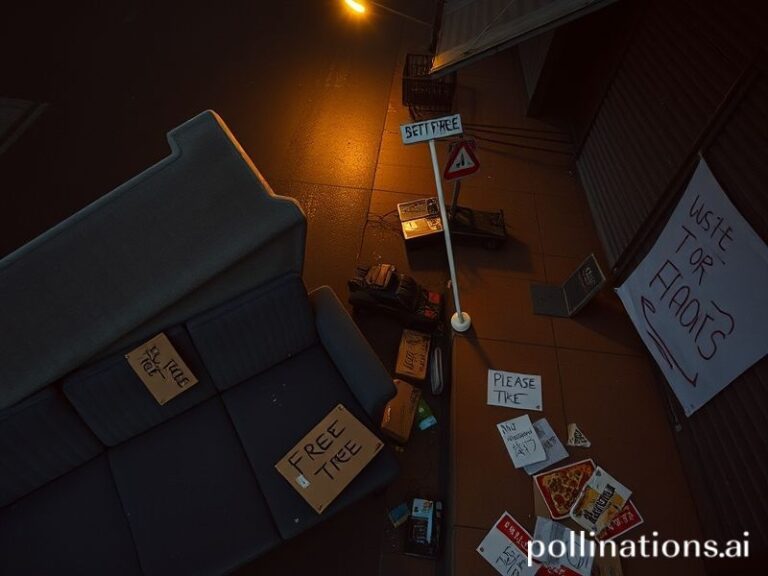Katarzyna Stoparczyk: How One Woman Rode the EU’s Open Borders All the Way to Infamy
Katarzyna Stoparczyk and the Quiet Collapse of Borders
By our correspondent in the departure-lounge bar, Gate B12, somewhere east of reason
If you have never heard of Katarzyna Stoparczyk, do not feel slighted; the planet’s filing system is famously sloppy. Yet in the humming corridors of Interpol’s General Secretariat in Lyon—where the coffee tastes like photocopier toner and hope is rationed like printer paper—her name has become the bureaucratic equivalent of a recurring nightmare. Stoparczyk, 38, Polish national, alleged fraudster, and apparently gifted linguist, has spent the last decade slipping through Europe’s supposedly seamless web of open borders, leaving behind a trail of phoney NGOs, vanished grants, and bewildered mayors from Tallinn to Trieste.
Interpol’s Red Notice on her—issued, withdrawn, re-issued, then quietly annotated with the word “reviewed” in that exquisite passive voice governments use when they have run out of ideas—has become a minor legend in the world’s consular waiting rooms. It is also a neat parable for our age: in a system designed to let the virtuous circulate freely, the unvirtuous circulate even more freely, carrying only a smile and a QR code.
From Singapore to São Paulo, compliance officers now use Stoparczyk as a verb, as in “We just got Stoparczyked on that Lithuanian micro-loan.” It is small comfort to the Lithuanians, who discovered last spring that the €2 million earmarked for a “Green Futures Accelerator” had instead accelerated straight into crypto wallets registered in the British Virgin Islands—a jurisdiction whose entire economic model appears to be “we can keep a secret.” The Lithuanians responded with a press conference, a task force, and a PowerPoint so dense it violated several Geneva conventions.
Stoparczyk’s genius, investigators say, lies not in technical wizardry but in an anthropological insight: the modern world loves urgent paperwork. Flash a grant proposal with the word “sustainability” in Comic Sans and most municipalities will stamp it twice before lunch. Add a photo of smiling children holding solar panels and you can empty a treasury faster than you can say “public-private partnership.”
The wider punchline is geopolitical. While European ministers bicker over whether to fund another border fence, Stoparczyk simply flies business class. Her passport carousel—Polish, then Czech, then a tastefully weathered Canadian one—illustrates a truth too awkward for campaign slogans: globalization works brilliantly for people who ignore its rules. Every time a customs officer waves her through, the Schengen dream suffers another tiny stroke.
Meanwhile, in parts of the world where borders still kill, her escapades read like satire. A Nigerian analyst I met at a gloomy conference in Abidjan laughed until he wheezed: “So Europe can track a cow from field to abattoir, but one bilingual woman with a laptop steals a hospital budget? Please.” His laughter was the hollow kind reserved for the powerless watching the powerful misplace their keys.
Back in Brussels, the European Anti-Fraud Office has convened a “reflection group”—which is Euro-speak for “panic room with pastries.” Their latest strategy document, leaked to this correspondent over lukewarm Orval, proposes “enhanced civic-awareness nudges,” a phrase so meaningless it could run for parliament.
Will Stoparczyk ever be caught? Possibly. The same system that can’t track €2 million can, when sufficiently embarrassed, find a single human. The smart money says she will eventually surface in Dubai—global capital of the transiently wealthy—running a start-up that sells carbon credits for imaginary forests. Investors will line up; TEDx will invite her to speak on “Disruptive Philanthropy.” And somewhere in Vilnius, a junior auditor will stare at another suspicious invoice and feel the cosmic shrug that passes for justice these days.
Until then, her story serves as a postcard from late-stage capitalism: glossy, implausible, and postmarked nowhere in particular. Read it, smirk, and clutch your wallet—assuming you still have one.







